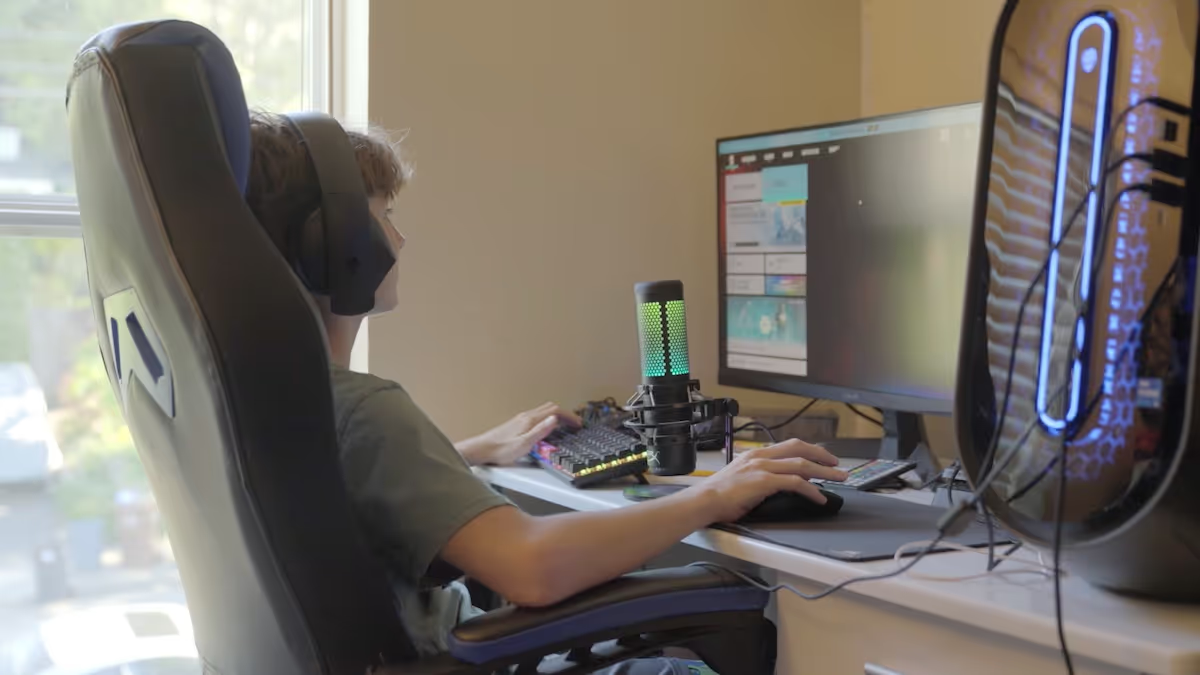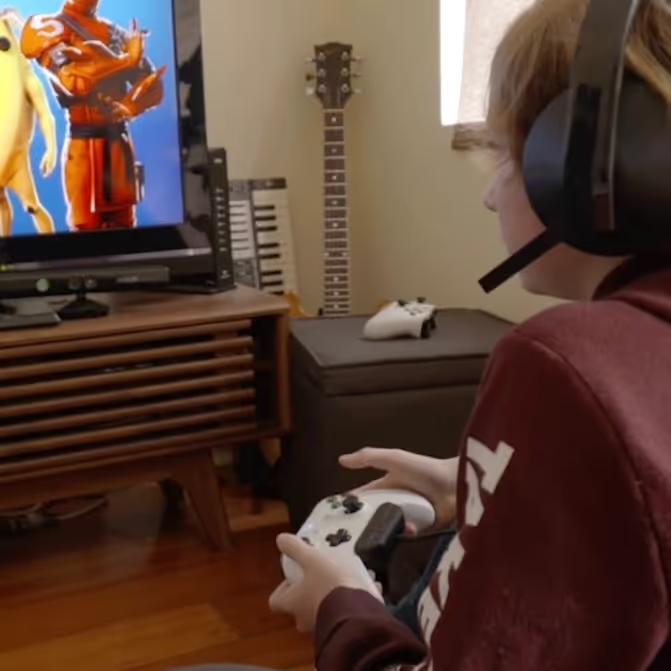


For a long time, people have been talking about how video games might be linked to extreme acts of violence, such as school shootings. The fact is millions of youth have played violent video games, and far less than 1% will ever do any such acts of violence.
This does not, however, mean that young people are not impacted by hours of gaming that has at its core the idea of aggression — of fighting, killing, and so forth.
Of course, the degree of aggression and violence in games is on a continuum. However, research on the impact of aggression from violent games finds similarities regardless of whether there is fighting in a game like Fortnite or more realistic graphics in a game like Call of Duty.
It is not unusual for family members to disagree about any possible effects of such types of games.
Take, for example, this little moment in Screenagers Elementary School Age Edition:
Mom of 11-year-old Thomas says, “I don't think I've rationalized that playing violent games is okay,”
Then Thomas's dad says, “ I played board games out in the neighborhood when I was a kid, and this is something different than that, but it's similar.
Then Thomas says while playing a first-person shooter game, “I'm guessing that it would impact some but not really me.”
Learn more about showing our movies in your school or community!
Join Screenagers filmmaker Delaney Ruston MD for our latest Podcast

Learn more about our Screen-Free Sleep campaign at the website!
Our movie made for parents and educators of younger kids
Learn more about showing our movies in your school or community!
Study 1: In one study with over 3,000 children, Dr. Gentile and his team followed the kids over three years, looking at how playing violent video games might impact their thoughts and behaviors. The study measured something called “hostile attribution bias,” which looks at how likely a child is to interpret someone’s actions as hostile. They found that kids who played a lot of violent video games showed a noticeable increase in this bias, making them more likely to assume the worst in a situation, which can lead to more aggressive responses.
Another part of Dr. Gentile’s research focused on the kids’ beliefs about aggression. In a different study than above, his team found that kids who frequently played violent video games began to view aggressive responses as more acceptable when they felt provoked. This shift didn’t just influence their actions; it also subtly shaped their beliefs about aggression, making it seem more justifiable in everyday situations.
Study 2: Meanwhile, several studies have explored the effects of violent video games on aggressive behavior using hot sauce allocation and loud noise blasts as measures. These experiments often use random assignment to different game conditions to test whether players who engage in violent gameplay show increased aggressive behaviors afterward.
In one typical setup, participants are divided into groups, one playing a violent video game (like Call of Duty) and the other playing a non-violent game (like Tetris). Afterward, aggression levels are measured by how much hot sauce they assign to another person who dislikes spicy food or how loudly they blast an unpleasant sound toward another participant. Findings from studies like those by Anderson and Dill have shown that participants exposed to violent games tend to administer more hot sauce and higher volumes of noise, suggesting heightened aggression.
These methods, while not directly measuring real-world violence, aim to assess the participants' willingness to cause discomfort in others, providing a controlled environment for studying aggression resulting from media exposure.
These studies derived important empirical data showing that violent video games can gradually influence a child’s mindset, impacting both their reactions and their beliefs about what’s acceptable. While not every child will react the same way, Gentile’s research and these other studies underscore the importance of considering the kinds of impacts these games have.
Working to have a variety of video games, such as prosocial ones, is a great idea, and having discussions about fighting games is key.
Learn more about showing our movies in your school or community!
Join Screenagers filmmaker Delaney Ruston MD for our latest Podcast

Learn more about our Screen-Free Sleep campaign at the website!
Our movie made for parents and educators of younger kids
Join Screenagers filmmaker Delaney Ruston MD for our latest Podcast
Be sure to subscribe to our YouTube Channel! We add new videos regularly, you'll find over 100 videos covering parenting advice, guidance, podcasts, movie clips and more. Here's our most recent:
As we’re about to celebrate 10 years of Screenagers, we want to hear what’s been most helpful and what you’d like to see next.
Please click here to share your thoughts with us in our community survey. It only takes 5–10 minutes, and everyone who completes it will be entered to win one of five $50 Amazon vouchers.
For a long time, people have been talking about how video games might be linked to extreme acts of violence, such as school shootings. The fact is millions of youth have played violent video games, and far less than 1% will ever do any such acts of violence.
This does not, however, mean that young people are not impacted by hours of gaming that has at its core the idea of aggression — of fighting, killing, and so forth.
Of course, the degree of aggression and violence in games is on a continuum. However, research on the impact of aggression from violent games finds similarities regardless of whether there is fighting in a game like Fortnite or more realistic graphics in a game like Call of Duty.
It is not unusual for family members to disagree about any possible effects of such types of games.
Take, for example, this little moment in Screenagers Elementary School Age Edition:
Mom of 11-year-old Thomas says, “I don't think I've rationalized that playing violent games is okay,”
Then Thomas's dad says, “ I played board games out in the neighborhood when I was a kid, and this is something different than that, but it's similar.
Then Thomas says while playing a first-person shooter game, “I'm guessing that it would impact some but not really me.”
Study 1: In one study with over 3,000 children, Dr. Gentile and his team followed the kids over three years, looking at how playing violent video games might impact their thoughts and behaviors. The study measured something called “hostile attribution bias,” which looks at how likely a child is to interpret someone’s actions as hostile. They found that kids who played a lot of violent video games showed a noticeable increase in this bias, making them more likely to assume the worst in a situation, which can lead to more aggressive responses.
Another part of Dr. Gentile’s research focused on the kids’ beliefs about aggression. In a different study than above, his team found that kids who frequently played violent video games began to view aggressive responses as more acceptable when they felt provoked. This shift didn’t just influence their actions; it also subtly shaped their beliefs about aggression, making it seem more justifiable in everyday situations.
Study 2: Meanwhile, several studies have explored the effects of violent video games on aggressive behavior using hot sauce allocation and loud noise blasts as measures. These experiments often use random assignment to different game conditions to test whether players who engage in violent gameplay show increased aggressive behaviors afterward.
In one typical setup, participants are divided into groups, one playing a violent video game (like Call of Duty) and the other playing a non-violent game (like Tetris). Afterward, aggression levels are measured by how much hot sauce they assign to another person who dislikes spicy food or how loudly they blast an unpleasant sound toward another participant. Findings from studies like those by Anderson and Dill have shown that participants exposed to violent games tend to administer more hot sauce and higher volumes of noise, suggesting heightened aggression.
These methods, while not directly measuring real-world violence, aim to assess the participants' willingness to cause discomfort in others, providing a controlled environment for studying aggression resulting from media exposure.
These studies derived important empirical data showing that violent video games can gradually influence a child’s mindset, impacting both their reactions and their beliefs about what’s acceptable. While not every child will react the same way, Gentile’s research and these other studies underscore the importance of considering the kinds of impacts these games have.
Working to have a variety of video games, such as prosocial ones, is a great idea, and having discussions about fighting games is key.
Be sure to subscribe to our YouTube Channel! We add new videos regularly, you'll find over 100 videos covering parenting advice, guidance, podcasts, movie clips and more. Here's our most recent:
Sign up here to receive the weekly Tech Talk Tuesdays newsletter from Screenagers filmmaker Delaney Ruston MD.
We respect your privacy.
For a long time, people have been talking about how video games might be linked to extreme acts of violence, such as school shootings. The fact is millions of youth have played violent video games, and far less than 1% will ever do any such acts of violence.
This does not, however, mean that young people are not impacted by hours of gaming that has at its core the idea of aggression — of fighting, killing, and so forth.
Of course, the degree of aggression and violence in games is on a continuum. However, research on the impact of aggression from violent games finds similarities regardless of whether there is fighting in a game like Fortnite or more realistic graphics in a game like Call of Duty.
It is not unusual for family members to disagree about any possible effects of such types of games.
Take, for example, this little moment in Screenagers Elementary School Age Edition:
Mom of 11-year-old Thomas says, “I don't think I've rationalized that playing violent games is okay,”
Then Thomas's dad says, “ I played board games out in the neighborhood when I was a kid, and this is something different than that, but it's similar.
Then Thomas says while playing a first-person shooter game, “I'm guessing that it would impact some but not really me.”

Games like Roblox and Fortnite, which are especially popular among younger video gamers, may seem highly appealing due to their free-to-play model. Of course, they are not truly free. Young people are powerfully compelled to purchase in game currencies using real money, which in turn are used to purchase virtual items like costumes (skins) and weapons. Learn more about how this works in practice and what we can do as parents to help guide our kids.
READ MORE >
In today's blog, I delve into the darker side of gaming, from the aggressive exchanges and trash-talking in first-person shooters like Call of Duty and even Minecraft and Roblox. This discussion is featured in my latest podcast episode, where I interview a gamer and Dr. Kishonna Gray, an assistant professor in digital studies at the University of Kentucky. Dr. Gray, who explores the human dynamics in video games and assists parents in navigating challenging aspects of gaming culture, provides valuable insights and solutions.
READ MORE >for more like this, DR. DELANEY RUSTON'S NEW BOOK, PARENTING IN THE SCREEN AGE, IS THE DEFINITIVE GUIDE FOR TODAY’S PARENTS. WITH INSIGHTS ON SCREEN TIME FROM RESEARCHERS, INPUT FROM KIDS & TEENS, THIS BOOK IS PACKED WITH SOLUTIONS FOR HOW TO START AND SUSTAIN PRODUCTIVE FAMILY TALKS ABOUT TECHNOLOGY AND IT’S IMPACT ON OUR MENTAL WELLBEING.
